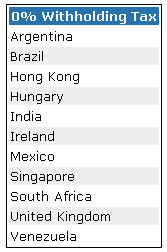My friend Chris was irate. 'My broker just ripped me off!' he pouted. 'Royal Dutch Shell (NYSE: RDS-A) said in a press release they would pay $0.84 a share, but instead my broker gave me $0.714 a share.'
I tried to explain to Chris that it's not his broker's fault. The broker doesn't withhold the amount. Royal Dutch Shell is a foreign company. It's based in the Netherlands and is required to withhold the tax Chris owes on the dividend.
'But I pay taxes in the United States,' Chris insisted. 'The U.S. government will get 15% of my dividend. It's not fair that I pay some foreign government taxes, too.'
I agreed with him it doesn't seem fair. But I asked him to look at it in another way. The foreign government is just trying to recoup millions of dollars in lost taxes it incurs when a company pays dividends or interest to foreign taxpayers outside their country.
U.S. vs. Other Countries
The United States does the same thing. Just about every country does. Greece withholds 30% to U.S. taxpayers, the Philippines take off 25%, and South Korea shaves 16.5% off the top. Most other countries take 15% off the dividends to U.S. taxpayers and, in turn, the U.S. takes 15% of their country's dividends payments. Interest and royalty payments are also taxed, but the rates tend to vary depending on the country. (For a handy list of foreign withholding taxes, check out the Deloitte & Touche website.)
Foreign withholding taxes would be even greater if the U.S. didn't have tax treaties to promote mutual investment with many countries. For instance, the statutory withholding tax for the Netherlands is 25%, but the tax treaty brings the statutory rate down to 15%. That's why Chris got 85% of the declared dividend, or $0.714 a share.
Generally, the higher yields you can get from foreign equities can make up the difference. For example, Royal Dutch Shell's nearly 7% yield is more than twice that of Texas-based Exxon Mobil (NYSE: XOM), and the yields on Canadian royalty trusts such as Pengrowth (NYSE: PGH) are even higher.
Also, you can claim credit or take a tax deduction for the foreign tax withheld by filing IRS Form 1116. But when the foreign security is an American Depository Receipt (ADR) that's held in a tax-deferred IRA or 401(k) type of account, you generally can't recoup the tax. However, since you're not dinged with the 15% U.S. dividend tax in this account, the taxes you pay to a foreign country are equivalent to what you pay Uncle Sam in a taxable brokerage account, so it's a wash.
Exemptions From Withholding Tax
Besides, there are exceptions.
Germany, for one, exempts IRAs from the German withholding tax under a revised treaty with the United States. Germany withholds 15% of the dividend from your taxable account, but refunds the withholding tax on German dividend-paying corporations held in an IRA or other qualified U.S. pension fund.

Canada recently revised its tax treaty with the United States as well. As of 2009, Canadian corporate dividends and interest income are exempt from the 15% withholding tax if they are held in an IRA or 401(k). That means you should now be able to hold converted income trusts in an IRA without being dinged the 15% withholding tax.
The best news is there are about a dozen major equity markets around the world where the withholding tax on qualifying dividends is zilch. You pay no withholding tax and you get to pocket every penny of the dividend. To the right is a list of some of these foreign tax havens.
Some of these countries also offer compelling yields, making them exceptionally attractive as a destination spot for income investors.
And without the foreign withholding taxes, the after-tax returns are that much sweeter.



